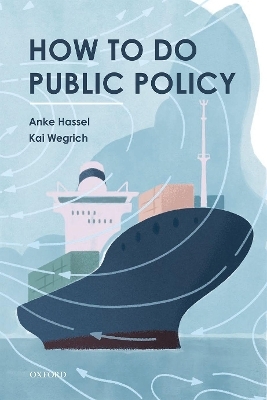
How to Do Public Policy
Oxford University Press (Verlag)
978-0-19-874719-2 (ISBN)
How to Do Public Policy offers a guide to students and practitioners on how to improve problem-solving with policies in a political world. It integrates insights from applied policy analysis and studies of the policy process to develop a framework that conceives policy-making as structured by two spheres of action - the 'engine room' of specialists and experts in government agencies, NGOs, research organizations etc., on the one hand, and the political 'superstructure' of politicians, key public stakeholders and the public, on the other hand. Understanding the different logics of the engine room and the superstructure is key for successful policy-making. The dual structure of policy-making provides a perspective on policy-analysis (interactive policy analysis) and policy-making (actor-centred policy-making) that moves from the focus on individual and specific measures, towards understanding and shaping the relation and interaction between policy interventions, the institutional context and the stakeholders involved or affected. Part I of the book presents the basic analytical concepts needed to understand the policy process and the structures and dynamics involved in it, as well as to understand how and why actors behave the way they do-and how to engage with different types of actors. Part II moves further into the nuts and bolts of policy-making, including policy design, implementation, and evaluation. Part III introduces and explores three key aspects of the capacity to make good policies: engagement with stakeholders, the process of policy coordination in a context of interdependence, and the role of institutions.
Anke Hassel is Professor of Public Policy at the Hertie School. Anke Hassel has extensive international experience and scientific expertise in the fields of the labour market, social partnership, codetermination and the comparative political economy of developed industrial nations. She was an expert in the fact-finding committee on growth, prosperity and quality of life in the German Bundestag (2012-13) and a member of the German Federal Government's High-Tech Forum (2019-21). Kai Wegrich is Professor of Public Administration and Public Policy at the Hertie School. His main research interests lie in the areas of bureaucratic politics, regulation, policy implementation and public sector reform. His publications include The Problem-Solving Capacity of the Modern State (co-edited with Martin Lodge, Oxford University Press, 2014) and The Blind Spots of Public Bureaucracy and the Politics of Non-Coordination (co-edited with Tobias Bach, Palgrave, 2019).
Part I: Process
Intro to Part I: Understanding the Policy Process
1: Public Policy
2: The Dual Structure of Policy Making
3: How to Set the Agenda
Part II Policies
Intro to Part II: Understanding the Toolbox
4: How to Choose and Design Policy Instruments
5: How to Implement Public Policy
6: How to Evaluate Policies
Part III: Capacities
Intro to Part III: Understanding Capacities
7: How to Engage with Stakeholders
8: How to Coordinate Public Policy
9: How to Work with Institutions
10: Conclusions
Annex
| Erscheinungsdatum | 18.03.2022 |
|---|---|
| Verlagsort | Oxford |
| Sprache | englisch |
| Maße | 156 x 234 mm |
| Gewicht | 680 g |
| Themenwelt | Sozialwissenschaften ► Politik / Verwaltung ► Politische Theorie |
| Sozialwissenschaften ► Politik / Verwaltung ► Staat / Verwaltung | |
| ISBN-10 | 0-19-874719-5 / 0198747195 |
| ISBN-13 | 978-0-19-874719-2 / 9780198747192 |
| Zustand | Neuware |
| Haben Sie eine Frage zum Produkt? |
aus dem Bereich


